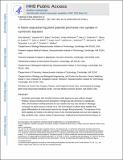A haem-sequestering plant peptide promotes iron uptake in symbiotic bacteria
Author(s)
Sankari, Siva; Babu, Vignesh MP; Bian, Ke; Alhhazmi, Areej; Andorfer, Mary C; Avalos, Dante M; Smith, Tyler A; Yoon, Kwan; Drennan, Catherine L; Yaffe, Michael B; Lourido, Sebastian; Walker, Graham C; ... Show more Show less
DownloadAccepted version (4.667Mb)
Open Access Policy
Open Access Policy
Creative Commons Attribution-Noncommercial-Share Alike
Terms of use
Metadata
Show full item recordAbstract
Symbiotic partnerships with rhizobial bacteria enable legumes to grow without nitrogen fertilizer because rhizobia convert atmospheric nitrogen gas into ammonia via nitrogenase. After Sinorhizobium meliloti penetrate the root nodules that they have elicited in Medicago truncatula, the plant produces a family of about 700 nodule cysteine-rich (NCR) peptides that guide the differentiation of endocytosed bacteria into nitrogen-fixing bacteroids. The sequences of the NCR peptides are related to the defensin class of antimicrobial peptides, but have been adapted to play symbiotic roles. Using a variety of spectroscopic, biophysical and biochemical techniques, we show here that the most extensively characterized NCR peptide, 24 amino acid NCR247, binds haem with nanomolar affinity. Bound haem molecules and their iron are initially made biologically inaccessible through the formation of hexamers (6 haem/6 NCR247) and then higher-order complexes. We present evidence that NCR247 is crucial for effective nitrogen-fixing symbiosis. We propose that by sequestering haem and its bound iron, NCR247 creates a physiological state of haem deprivation. This in turn induces an iron-starvation response in rhizobia that results in iron import, which itself is required for nitrogenase activity. Using the same methods as for L-NCR247, we show that the D-enantiomer of NCR247 can bind and sequester haem in an equivalent manner. The special abilities of NCR247 and its D-enantiomer to sequester haem suggest a broad range of potential applications related to human health.
Date issued
2022Department
Massachusetts Institute of Technology. Department of Biology; Howard Hughes Medical Institute; Whitehead Institute for Biomedical Research; Massachusetts Institute of Technology. Department of Biological Engineering; Massachusetts Institute of Technology. Department of Chemistry; Center for Precision Cancer MedicineJournal
Nature Microbiology
Publisher
Springer Science and Business Media LLC
Citation
Sankari, Siva, Babu, Vignesh MP, Bian, Ke, Alhhazmi, Areej, Andorfer, Mary C et al. 2022. "A haem-sequestering plant peptide promotes iron uptake in symbiotic bacteria." Nature Microbiology, 7 (9).
Version: Author's final manuscript